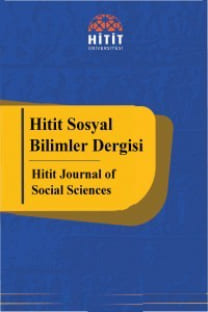THE RELIGIOUS LIVES OF EUROPEAN TURKS; The Role of Religious Groups
Referring the Turks that migrated Europe’s several countries as “temporary workers” in 1960, it is obvious that neither Turkey nor receiving countries had no policy about migration with the thought that they would “come back”. Since late 1970s, the receiving countries’ point of view has changed in the way that Turks wouldn’t be temporary but permanent. So they developed some strategies and policies such as social security laws, repentance law for illegal or tourist-worker, family reunification law, foreigner laws etc. The purpose of these new laws was to take the immigration wave under control and supporting immigrant integration in Europe. Turkey as an emigration country, during those days, started to take some serious steps about preventing its own citizens from assimilation and helping them to integrate successfully. During the migration process, from the early 1960s to the middle of 1980s, there was no official religious services for Turkish immigrants living in Europe. For 20 years or about, those people had been destined to be on their own in that period of time. Within that period also religious services had been carried out mostly with the hand of some religious groups, communities and movements in Turkey. In this paper, Turkey-connected religious groups and communities’ influence on the European Turkish immigrants’ daily religious life will be evaluated with a macro-sociological point of view.
Anahtar Kelimeler:
European Turks, Daily Religious Life, Religious Groups and Movements
___
- ABADAN-UNAT, Nermin. (2006). Bitmeyen Göç Konuk İşçilikten Ulus-Ötesi Yurttaşlığa, [From Guest Worker to Transnational Citizen]. İstanbul: İstanbul Bilgi Üniversitesi Yayınları. (Turkish). ADIGÜZEL, Yusuf. (2011). Yeni Vatanda Dini İdeolojik Yapılanma Almanya’daki Türk Kuruluşları, [Religious and Ideological Situations in the New Homeland; Turkish Organizations in Germany]. İstanbul: Şehir Yayınları. (Turkish). ALTINTAŞ, İsmail. (2008). Dış-Göç ve Din; Almanya’daki Türklerin Dini Hayatına İlişkin Sosyolojik Bir Çözümleme, [External-Migration and Religion; A Sociological Analysis on the Religious Life of Turks in Germany]. İstanbul: Dem Yayınları. (Turkish). ARABACI, Fazlı. (1997). “Fransa’da Müslüman Toplumun Örgütlenmesi ve Türk İslam Kimliğini Korumada Cami ve derneklerin Fonksiyonu” [The Organization of Muslim Society in France and the Function of Mosques in the Protection of Turkish Islamic Identity]. Diyanet İlmi Dergi, Cilt: 33, Sayı: 3, ss. 87-106. (Turkish). ÇELİK, Celaleddin. (2008). “Almanya’da Türkler: Sürekli Yabancılık, Kültürel Çatışma ve Din”, [Turks in Germany: Continuous Foreignness, Cultural Conflict and Religious]. Milel ve Nihal, cilt: 5, sayı: 3, ss. 105-142. (Turkish). ÇOŞTU, Yakup. (2013). İngiltere’deki Tük-Müslüman Göçmenler; Dini Organizasyonlar, [Turkish Muslim Immigrants in the UK; Religious Organizations]. Çorum: Lider Matbaası. (in Turkish). ÇOŞTU, Yakup & Feyza CEYHAN ÇOŞTU, An Investigation on the Turkish Religious Foundation of the UK (Diyanet)”, Turkish Migration, Identity and Integration, Ed. İ. Sirkeci, B. D. Şeker, and A. Çağlar, Transnational Press London, London, 2015. pp. 149-157. DIB, General Directorate of External Relations, 2012 HATUNOĞLU, Bedri Yavuz. (2002). Hollanda’da Türk Sivil Örgütlenmesi ve Türkevi Örneği, [Turkish Non-Governmental Organizations in the Netherlands and the Case of Turkish House]. (Doktora Tezi), Sakarya: Sosyal Bililer Enstitüsü, Sosyoloji anabilim Dalı, Sakarya Üniversitesi. (Turkish). HIDIR, Özcan. (2012). Hollanda’daki Türkler; Kurumlar, Başarılar, Sorunlar ve Geleceğe Yönelik Perspektifler, [Turks in Holland; Institutions, Achievements, Problems and Future Perspectives]. Rotterdam: IUR Press. (Turkish). JORGENSEN, Martin Bak. (2010). “Turks in Denmark: Patterns of Incorporation and Collective Organizing Processes”, Insight Turkey, Vol. 12, No. 1, ss. 163-183. KORKMAZ, Arif. (2011). Göç ve Din; İsveç’teki Kululular Örneği, [Migration and Religion; The Case of Kulu in Sweden]. Konya: Çizgi Kitabevi. (Turkish). KROISSENBRUNNER, Sabine. (2003). “Islam and Muslim Immigrants in Austria: socio-Political Networks and Muslim Leadership of Turkish Immigrants”, Immigrants & Minorities, Vol. 22, No: 2&3, ss. 188-207. KÜÇÜKCAN, Talip. (1999). Politics of Ethnicity, Identity and Religion Turkish Muslims in Britain, Aldershot: Ashgate. KÜÇÜKCAN, Talip. (2004). “The Making of Turkish-Muslim Diaspora in Britain: Religious Collective Identity in a Multicultural Public Sphere”, Journal of Muslim Minority Affairs, Vol. 24, No. 2, ss. 243-258. ÖZMEN, Nebile (2012). Çokkültürlü Toplumda Sosyal Entegrasyon ve Din, [Social Integration and Religion in Multicultural Society]. İstanbul: Çamlıca Yayınları. (Turkish). PERŞEMBE, Erkan. (2005). Almanya’da Türk Kimliği Din ve Entegrasyon, [Turkish Identity in Germany; Religion and Integration], Ankara: Araştırma Yayınları. (Turkish). ROGSTAD, Jon. (2009). “Towards a Success Story? Turkish Immigrant Organizations in Norway”, Turkish Studies, Vol. 10, No. 2, ss. 277-294. SİRKECİ, İbrahim, T. BİLECEN, Y. ÇOŞTU, S. DEDEOĞLU, M. R. KESİCİ, B. D. ŞEKER, F. TİLBE, K. O. UNUTULMAZ, Little Turkey in Great Britain, Transnational Press London, London, 2016. TRIANDAFYLLIDOU, Anna. (2010). “Muslims in 21 st Century Europe”, Muslims in 21 st Century Europe Structural and Cultural Perspectives, Ed. A. Triandafyllidou, New York: Routledge, ss. 1-26. YANAŞMAYAN, Zeynep. (2010). “Role of Turkish Islamic Organizations in Belgium: The Strategies of Diyanet and Milli Görüş”, Insight Turkey, Vol. 12, No. 1, ss. 139-161 YURDAKUL, Gökçe. (2009). From Guest Workers into Muslims: the Transformation of Turkish Immigrant Associations in Germany, Newcastle upon Tyne: Cambridge Scholars Publishing. YÜKLEYEN, Ahmet & Gökçe YURDAKUL. (2011). “Islamic Activism and Immigrant integration: Turkish Organizations in Germany”, Immigrants 6 Minorities, Vol. 29, No. 1, ss. 64-85. http://www.mfa.gov.tr/yurtdisinda-yasayan-turkler_.tr.mfa (Accessed date: 30.03.2017)
- Yayın Aralığı: Yılda 2 Sayı
- Başlangıç: 2008
- Yayıncı: Hitit Üniversitesi
Sayıdaki Diğer Makaleler
‘DURUMSAL MUHAFAZAKÂRLIK’ ANLAYIŞI ÜZERİNE TEORİK & ELEŞTİREL BİR DEĞERLENDİRME
‘DURUMSAL MUHAFAZAKÂRLIK’ ANLAYIŞI ÜZERİNE TEORİK & ELEŞTİREL BİR DEĞERLENDİRME
İLKOKUL ÇEVRE FARKINDALIK ÖLÇEĞİ GEÇERLİK GÜVENİRLİK ÇALIŞMASI
Nihal YILDIZ YILMAZ, Ayşe MENTİŞ TAŞ
SOSYAL HİZMET ve BAUMAN: SOSYAL ADALET
Doğa BAŞER, Huriye İrem KALAYCI KIRLIOĞLU, Mehmet KIRLIOĞLU
ORTAOKUL ÖĞRENCİLERİNİN ŞİİRE YÖNELİK TUTUMLARININ İNCELENMESİ
Ahmet İhsan KAYA, Recep BİNDAK
BEŞ YILLIK KALKINMA PLANLARINDA KÜLTÜR VE KÜLTÜRÜN KORUNMASI ÜZERİNE BİR İNCELEME
GİRİŞİMCİLİĞİN BELİRLEYENİ OLARAK GİRİŞİMSEL ÖZYETERLİLİK
KALKINMA VE DEVLET ALGISI: ÇORUM ÖRNEĞİ
KENTLİ YOKSULLARIN KONUT SORUNUNA YÖNELİK PROAKTİF BİR ÇÖZÜM ÖNERİSİ: ARTIMLI KONUT MODELİ
